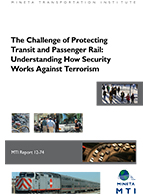- 408-924-7560
- mineta-institute@sjsu.edu
- Donate
The Challenge of Protecting Transit and Passenger Rail: Understanding How Security Works Against Terrorism
Terrorists see transit and passenger rail as an attractive target. Designed for public convenience, trains and stations offer terrorists easy access to crowds of people in confined environments where there are minimal security risks and attacks can cause high casualties. This report examines the unique attributes of the terrorist threat, how security measures against terrorism have evolved over the years, and their overall effectiveness.
Does security work? Empirical evidence is hard to come by. Terrorist incidents are statistically rare and random, making it difficult to discern effects. The fact that terrorists focus most of their attacks on targets with little or no security suggests that security influences their choice of targets. Increased security does not reduce terrorism overall, but appears to push terrorists toward softer targets. These indirect effects are visible only over long periods of time.
Public surface transportation poses unique challenges. It is not easy to increase security without causing inconvenience, unreasonably slowing travel times, adding significant costs, and creating vulnerable queues of people waiting to pass through security checkpoints. This has compelled rail operators to explore other options: enlisting passengers and staff in alerting authorities to suspicious objects or behavior, random passenger screening, designing new stations to facilitate surveillance and reduce potential casualties from explosions or fire, and ensuring rapid intervention.
BRIAN MICHAEL JENKINS
Brian Michael Jenkins is the director of the Mineta Transportation Institute’s National Transportation Center and since 1997 has directed the Institute’s continuing research on protecting surface transportation against terrorism and other serious forms of crime.
He received a Bachelor of Arts degree in fine arts and a Masters degree in history, both from UCLA. He also studied at the University of Guanajuato, Mexico, and in the Department of Humanities at the University of San Carlos, Guatemala, where he was a Fulbright Fellow and received a second fellowship from the Organization of American States.
Commissioned in the infantry at the age of 19, Mr. Jenkins became a paratrooper and ultimately a captain in the Green Berets. He is a decorated combat veteran, having served in the Seventh Special Forces Group in the Dominican Republic during the American intervention and later as a member of the Fifth Special Forces Group in Vietnam (1966–1967). He returned to Vietnam on a special assignment in 1968 to serve as a member of the Long Range Planning Task Group; he remained with the Group until the end of 1969, receiving the Department of the Army’s highest award for his service. Mr. Jenkins returned to Vietnam on an additional special assignment in 1971.
In 1983, Mr. Jenkins served as an advisor to the Long Commission, convened to examine the circumstances and response to the bombing of the U.S. Marine barracks in Lebanon. In 1984, he assisted the Inman Panel in examining the security of American diplomatic facilities abroad. In 1985–1986, he served as a member of the Committee of the Embassy of the Future, which established new guidelines for the construction of U.S. diplomatic posts. In 1989, Mr. Jenkins served as an advisor to the national commission established to review terrorist threats following the bombing of Pan Am 103. In 1993, he served as a member of the team contracted by the Port Authority of New York & New Jersey to review threats and develop new security measures for the World Trade Center following the bombing in February of that year. In 1996, President Clinton appointed Mr. Jenkins to the White House Commission on Aviation Safety and Security. From 1999 to 2000, he served as an advisor to the National Commission on Terrorism, and since 2000, he has been a member of the U.S. Comptroller General’s Advisory Board.
Mr. Jenkins serves as a Senior Advisor to the President of the RAND Corporation. He is a Special Advisor to the International Chamber of Commerce (ICC) and a member of the advisory board of the ICC’s investigative arm, the Commercial Crime Services. Over the years, he has served as a consultant to or carried out assignments for a number of government agencies, including the Department of Homeland Security. As part of its international project to create a global strategy to combat terrorism, the Club of Madrid in 2004 appointed Mr. Jenkins to lead an international working group on the role of intelligence. Mr. Jenkins is the author of numerous published research reports, books, and articles on terrorism and security.
-
Contact Us
San José State University One Washington Square, San Jose, CA 95192 Phone: 408-924-7560 Email: mineta-institute@sjsu.edu






